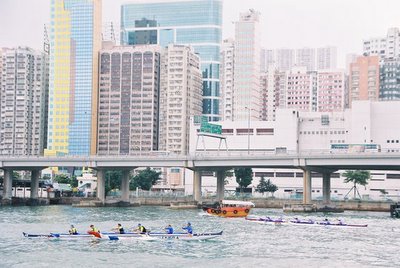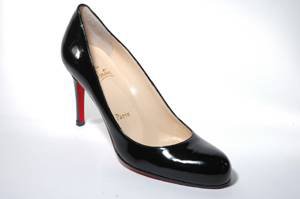
Yesterday I circumnavigated Hong Kong Island by sea: the club were paddling in the Round the Island Race in an all-male crew and I was in the support boat, a junk belonging to
The Economist. I was meant to be paddling, but there weren’t enough women to enter a separate crew; and I admit I was relieved because the race involves sea changes where you have to wait in the water for the boat to come by and then haul yourself over the gunwale while the person in the seat you’re headed for racks their paddle and bails out the other side. This is manageable in flat water, but in swells, in a race situation, and at speed, it is a thoroughly nerve-wracking prospect.
The race is organized by the Royal Hong Kong Yacht Club, takes place once a year and is for anything that is not engine-powered - usually yachts, although there are windsurfers too. It’s connected to the Harbour Day celebrations which are intended to promote the idea that, despite overwhelming evidence to the contrary, the harbour is for
everyone - tralala, and the day that it’s not too toxic to swim in and they stop reclaiming it to build shopping centres and prestige apartments maybe I’ll believe that.
This year, for the first time, outrigger canoes were permitted to take part. Our team took nearly 5 hours, and the yachts, which started later in stages according to class, came racing round Cape D’Aguilar at the south-east tip of the island and towards us in the blink of an eye. I looked back and there was the fleet (about 180 sailing boats of all sizes) bearing down on us in the late-morning sunshine: some with white sails and some with grey. It was an incredible sight. Then the wind dropped and all the yachts were becalmed not far from Aberdeen Harbour while our team moved past them again - a very strange sight, as their sails fell, and the current against them slowed their speed, and they looked across at the tiny six-man canoe slipping from their clutches.
The top outrigger team came from Hawaii and they completed the clockwise circuit of the island in just under four hours, beating all but a few of the yachts. The last stretch, into Victoria Harbour, was spectacular, with sails everywhere and the usual intense atmosphere of a somewhat polluted Sunday in the harbour: the Star Ferry crossing back and forth in wide loops to avoid the harbour reclamation project which inexorably impinges into the waterway; the Macau, Discovery Bay and Lamma ferries powering past us churning steaming water in their wake; tug boats pulling unimaginably heavy loads of what looked like sand and rocks; container ships towering with rusty ice cream blocks; the oily sheen of the water; the tall buildings rising into the smog; and what sounded like karaoke booming out from the Exhibition and Conference Centre.













